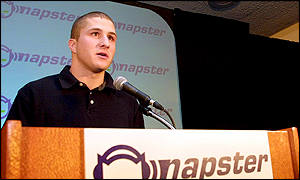| Front Page |
| World |
| UK |
| UK Politics |
| Business |
| Market Data |
| Economy |
| Companies |
| E-Commerce |
| Your Money |
| Business Basics |
| Sci/Tech |
| Health |
| Education |
| Entertainment |
| Talking Point |
| In Depth |
| AudioVideo |

The 9th Circuit Court of Appeals has issued its long-awaited ruling in the case of A&M Records v Napster.
Last summer, the District Court had enjoined Napster from continued operation on the ground that it was "knowingly encouraging and assisting" copyright infringement by allowing internet users to search for, and download, copyrighted music files.
Although the appeals court had stayed the injunction pending completion of the appeal process, the Court of Appeals has now dissolved the stay and ordered the injunction reinstated.
Sharing is 'commercial'
The appeals court rejected Napster's two main arguments.
Regarding Napster's claim that its users were not infringing copyright because sharing copyrighted musical compositions and sound recordings via the Napster service is protected by the "fair use" doctrine, the court held that the four fair use factors in the Copyright Act tip the balance in the record companies' favour.
In particular, the court noted that the file-sharing activities of Napster users' are "commercial" in nature - even though no fee is charged for shared files - because "repeated and exploitative copying of copyright works, even if the copies are not offered for sale, may constitute a commercial use."
The court noted that use of the Napster service harms the market for copyrighted music by causing record companies to lose CD sales they otherwise would make.
Secondly, the court rejected Napster's claim that it should not be held responsible for the infringing conduct of its users, ruling instead that Napster "knew or had reason to know" that its users were exchanging copyrighted files and therefore could be held responsible as a "contributory" copyright infringer.
Full trial
The case now returns to the District Court for a full trial.
While it licks its wounds, Napster may take some small comfort in the appeals court's references to the Supreme Court's 1984 decision in Sony v Universal Studios (the "home taping" case).
Sony held that a defendant who makes and sells equipment "capable of both infringing and 'substantial non-infringing' uses" cannot be liable for contributory infringement.
The Court of Appeals said the District Court had improperly looked only at current uses of the Napster system to determine whether there were substantial non-infringing uses, instead of considering "current and future non-infringing use."
If Napster can establish that its potential non-infringing uses are substantial ones, it may yet prevail.
David Post is Professor of Law, Temple University Law School and Senior Fellow, The Tech Center at George Mason University
| Search BBC News Online |
||
Advanced search options | ||
|
| |
|
| |
|
The digital music debate
| ||
|
| ||
|
Analysis
| ||
|
Features
| ||
| ||
The BBC is not responsible for the content of external internet sites
